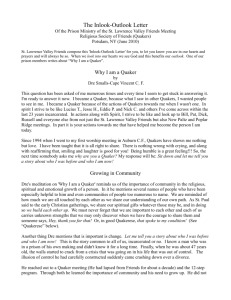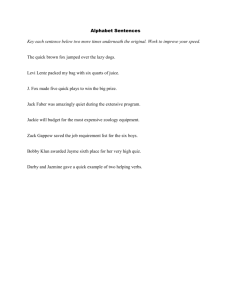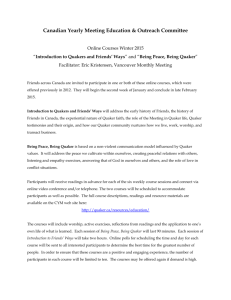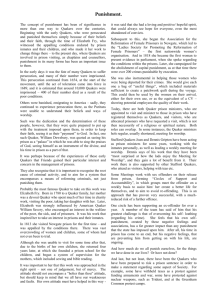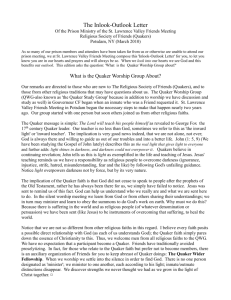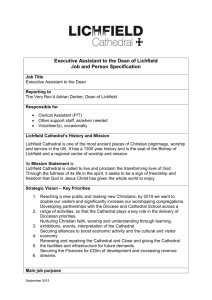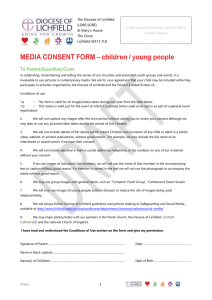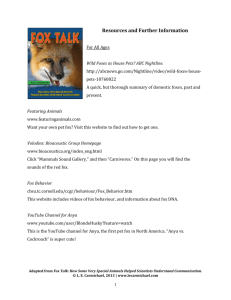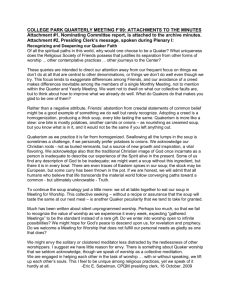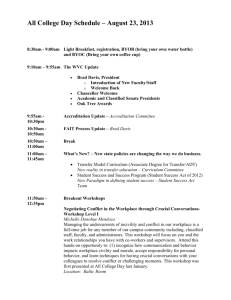QUAKERS IN LICHFIELD CATHEDRAL
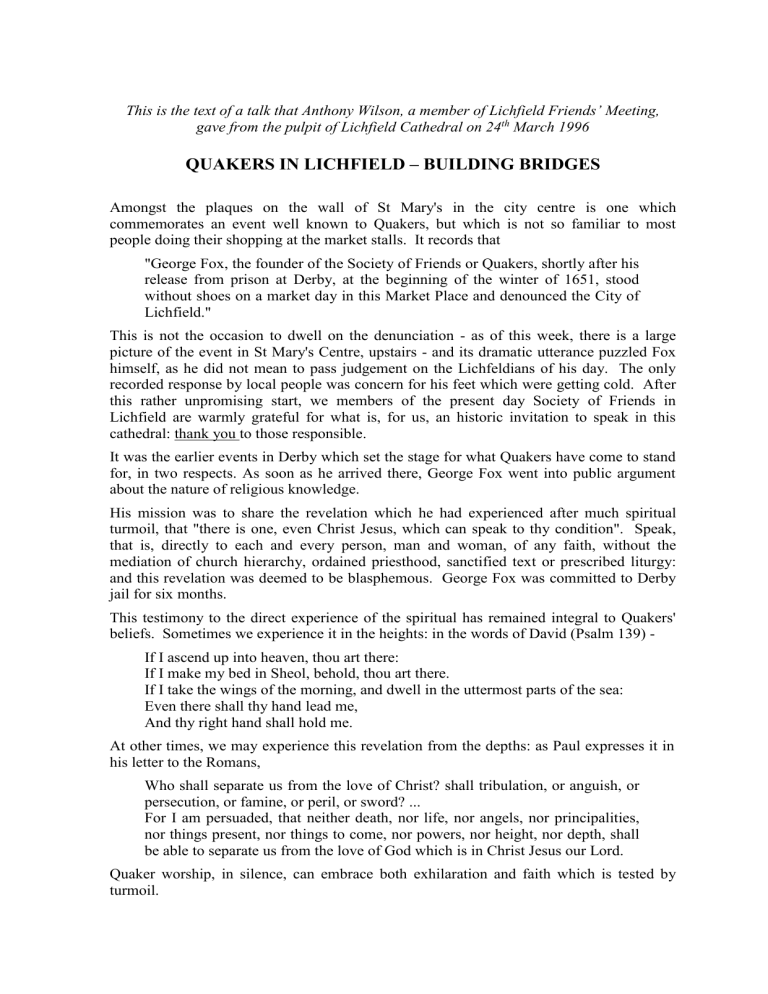
This is the text of a talk that Anthony Wilson, a member of Lichfield Friends’ Meeting, gave from the pulpit of Lichfield Cathedral on 24 th
March 1996
QUAKERS IN LICHFIELD – BUILDING BRIDGES
Amongst the plaques on the wall of St Mary's in the city centre is one which commemorates an event well known to Quakers, but which is not so familiar to most people doing their shopping at the market stalls. It records that
"George Fox, the founder of the Society of Friends or Quakers, shortly after his release from prison at Derby, at the beginning of the winter of 1651, stood without shoes on a market day in this Market Place and denounced the City of
Lichfield."
This is not the occasion to dwell on the denunciation - as of this week, there is a large picture of the event in St Mary's Centre, upstairs - and its dramatic utterance puzzled Fox himself, as he did not mean to pass judgement on the Lichfeldians of his day. The only recorded response by local people was concern for his feet which were getting cold. After this rather unpromising start, we members of the present day Society of Friends in
Lichfield are warmly grateful for what is, for us, an historic invitation to speak in this cathedral: thank you to those responsible.
It was the earlier events in Derby which set the stage for what Quakers have come to stand for, in two respects. As soon as he arrived there, George Fox went into public argument about the nature of religious knowledge.
His mission was to share the revelation which he had experienced after much spiritual turmoil, that "there is one, even Christ Jesus, which can speak to thy condition". Speak, that is, directly to each and every person, man and woman, of any faith, without the mediation of church hierarchy, ordained priesthood, sanctified text or prescribed liturgy: and this revelation was deemed to be blasphemous. George Fox was committed to Derby jail for six months.
This testimony to the direct experience of the spiritual has remained integral to Quakers' beliefs. Sometimes we experience it in the heights: in the words of David (Psalm 139) -
If I ascend up into heaven, thou art there:
If I make my bed in Sheol, behold, thou art there.
If I take the wings of the morning, and dwell in the uttermost parts of the sea:
Even there shall thy hand lead me,
And thy right hand shall hold me.
At other times, we may experience this revelation from the depths: as Paul expresses it in his letter to the Romans,
Who shall separate us from the love of Christ? shall tribulation, or anguish, or persecution, or famine, or peril, or sword? ...
For I am persuaded, that neither death, nor life, nor angels, nor principalities, nor things present, nor things to come, nor powers, nor height, nor depth, shall be able to separate us from the love of God which is in Christ Jesus our Lord.
Quaker worship, in silence, can embrace both exhilaration and faith which is tested by turmoil.
Back now, to George Fox in Derby jail, and a second feature of Quaker belief. His six months were nearly up when the government set about recruiting men for the army which it needed to face the would-be Charles II and the royalists at what was to be the Battle of
Worcester in September 1651. The new recruits were quartered in the same jail as George
Fox, where they clamoured to have him made their captain. He was brought before the
Commonwealth Commissioners and offered the post, together with his liberty. He refused, in words which still resonate with Friends the world over:
“I told them I lived in the virtue of that life and power which took away the occasion of all wars”.
This was not all that he said, and the outcome was that he was jailed for a second term.
This was the first explicit reference) to the pacifism which has since become a basic tenet of Quakerism. It has two roots. The most immediate is this capacity to experience the love of God which we describe as "the Inward Light", that of God in each of us which we have no human right to extinguish. The second is our understanding of Jesus' crucifixion: his decision to go to Jerusalem and face the 'principalities and powers', submitting to the most degrading and disgusting punishment of the day, in the belief that ultimately true peace and full freedom depend upon love which is selfless in its giving.
The letter inviting us to participate in this series of services asked us to indicate how we use Lent to reflect on how we understand our faith. Part of our reply is that growing in spiritual experience, and following a life-style which is compatible with this, is a challenge which we try (and probably fail) to meet right round the year - however much we may agree at an intellectual level about the value of setting particular times and seasons for spiritual reflection. The theme for Lenten study this year, 'Building Bridges', is one with which we feel much at home, and I will be returning to this after just one more brief historical excursion.
In spite of brave attempts by other individuals after George Fox, Quaker meetings scarcely feature in Lichfield history. Dean Addison's account of his purging the City of dissenters in
1684/5 helps to explain why no group could take root - he had "brought them all to holy communion except three or four anabaptists and one Quaker". It was three centuries later, in 1994, that a small group of Friends [with a capital F] who wished to gather were welcomed by Christchurch in Leomansley [just across the Park] with the offer of their church hall for our meeting. We were immediately invited to join Churches Together in
Lichfield, and last year were appointed chaplain to the mayor. This year, we have received this generous invitation to speak in this cathedral, which we feel belongs to all of us who live here. The bridge between Friends and other Churches has been built by those whose distant predecessors had tried to exclude us, and we cross it gladly.
So, returning to the letter of invitation, what do we Quakers bring with us towards an understanding of the Gospel in Lichfield? George Fox's testimony to the direct experience of the spiritual by each person has stood the test of time, and is no longer blasphemous - though Quakers' silent worship still emphasises this particular aspect of religious experience. Silence for Friends is not an absence of sound, but a time for positively listening for what we call "the promptings of love and truth". We may hear these deep within ourselves; they may be expressed by one of those present in words, spoken from his or her seat in the circle or open square in which we sit. The urge to speak in a Quaker meeting for worship is very different from composing an address to fit into a programmed occasion: you are not left searching for words to express an outward theme - they come to you with a compulsion which cannot be denied. We do not, however, speak "in tongues" in the Pentecostal tradition.
In this ecumenical setting, we are ready to place our corporate witness alongside the insights of fellow believers who draw on wider and maybe longer traditions than ourselves.
We are well aware that we must be amongst the smallest of the Churches in this country.
But, 'That all may be one' (the prophetic strap-line of the World Council of Churches) does not call for us all to be the same, and you may find us rather ready not to conform - though always, I hope, ready to learn from your experience of study, service and worship.
You can see that we are not very apt with theological definitions, as we look to experience to give meaning to life's mysteries. This offers no space for a fixed creed; and we do not sanctify particular days, seasons or places above others - all are to be revered as part of creation; more strangely still within the Christian tradition, we celebrate no formal sacraments - believing all life to be sacramental. At times of military conflict, our pacifism means that we try to be ready to share the suffering, and the hope which relief work with the victims of war can generate. In our normal daily round, we try to work for justice and peace wherever we find ourselves, in our workplaces and where we live. On a wider stage, Friends attempt to build bridges where confrontations occur at the U.N. and elsewhere around the world. We have no ordained clergy to act on our behalf, in natters of works or faith; what ordinary members of the Society do not do, does not happen. ‘God has no other hands but our’s’.
We join you now, believing that Jesus calls us into discipleship rather than structures, and to worship whose validity lies in its power rather than its form. In the words of London
Yearly Meeting in 1986, 'Our emphasis will always be on unity as a fellowship of the
Spirit in which diversity becomes creative, and in which, with the Holy Spirit
’ s help, we learn to love one another.
